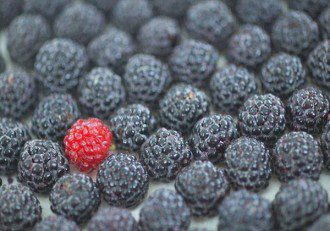8th June 2016
By Mae Chan
Guest writer for Wake Up World
An extract found in black raspberries can significantly lower arterial stiffness, a key measure of cardiovascular disease, according to data from a Korean study.
Black raspberry (Rubus occidentalis) has long been used in traditional alternative medicine in Korea because of its potential to improve vascular function. Previous research has shown that Black raspberries are highly effective in preventing colorectal tumors and esophageal cancer. Now, current findings establish a link between the consumption of this fruit and circulating endothelial progenitor cells (EPCs), which help repair and regenerate damaged arteries.
[pro_ad_display_adzone id=”110028″]
The Korean Trials
Researchers from Korea University Anam Hospital (Seoul) and Gochang Black Raspberry Research Institute (Korea) carried out the trial.
The results of a randomised controlled trial saw two groups of patients with metabolic syndrome receive either 750 mg/day of black raspberry extract or a placebo for 12 weeks.
Here, blood pressure, degree of vascular stiffness, circulating number of EPCs and various markers of inflammation were recorded at the start of the study and at a 12-week follow-up.
The team of researchers from Korea University Anam Hospital and Gochang Black Raspberry Research Institute in South Korea found vascular stiffness values were significantly decreased in the black raspberry group compared to the placebo group (–5% vs. 3%).
In addition, EPCs at the 12-week follow-up were significantly higher in the black raspberry group compared to the placebo group (19 microlitres vs. –28micro-L).
Indicators of inflammation, such as interleukin-6 (IL-6) and tumour necrosis factor-alpha (TNF), were significantly greater in the black raspberry group compared to the placebo group (–0.5 picogram per millilitre vs. –0.1 pg/ml, and –5.4 pg/ml vs. –0.8 pg/ml, respectively).
Adiponectin levels, a hormone involved in regulating metabolic processes, were significantly higher in the black raspberry group when compared to the baseline (2.9 micro-g/ml vs.– 0.2 micro-g/ml).
“The use of black raspberry significantly lowered the augmentation index and increased circulating EPCs, thereby improving CV risks in patients with metabolic syndrome during the 12-week follow-up,”
Black Raspberry Benefits
The health benefits of anthocyanidins such as those found in purple potatoes and its derivatives have been well-documented and add to an ever growing body of science to support the potential heart health benefits of black raspberries, with the bioactives proposed to be anthocyanins, flavonols, resveratrol, ellagitannin and tannins.
Check out this comparison graph that uses ORAC (a way of measuring antioxidant capacity) of different caneberries from Oregon State University Food Science:
Antioxidant compounds of black raspberry, in particular are effective in reducing blood pressure.
Black raspberry has long been used in traditional alternative medicine in Korea because of its potential to improve vascular function.
These components have already been well-documented for their anti-inflammatory, antioxidative and anti-atherosclerotic effects.
Studies have shown antioxidant compounds of black raspberry, in particular as especially effective in reducing blood pressure and improving arterial stiffness.
Some studies have demonstrated black raspberries improve blood pressure, lipid profiles and vascular function.
The researchers pointed towards the fruit’s flavonoid content as primarily responsible for the improvement of vascular function in the subjects.
Flavonoids are known to increase bioavailability of nitric oxide (NO) and the enzyme endothelial nitric oxide synthase (eNOS), two known factors that contribute to the relaxation of coronary arteries.
Anthocyanins too were highlighted as factors that possess an anti-inflammatory and antioxidant capacity, further improving vascular function by up-regulating NO and eNOS.
Meanwhile, the researchers hypothesised that the degree of vascular stiffness was lessened due to the increased circulating number of EPCs.
EPCs are believed to home into the injury site to replicate endothelial cells and activate the endogenous repair system.
“The number of circulating EPCs inversely correlates with CV risk factors, suggesting that the circulating number of EPCs is lower in patients with CV diseases,” the study noted.
“Increases in circulating EPCs during the 12-week follow-up in this study suggest rapid restoration to the damaged endothelium, thereby contributing to the improvement of arterial stiffness and the augmentation index.”
Article sources:
Previous articles by Mae Chan:
- Junk Food Eating Generations Can Pass Metabolic Disorders to Their Children
- 17 of the Most Under-rated Medicinal Plants in the World
- 9 Natural Alternatives to Ibuprofen/NSAIDs Without the Side Effects
- Your Stomach and Digestive Tract Can Collect Significant Amounts of Wax and Chemicals by Using These Daily
- Vitamin D Improves Mood, Cognition and Pain Tolerance
- World’s Largest Solar Thermal Power Project Capable Of Providing Clean Energy To 140,000 Homes
- Hemp Seed Oil a Valuable Source of Bioactive Compounds for Food and Cosmetic Industry
- Canadian Researchers Discover Evidence That Vitamin D Shuts Down Cancer Cells
- Refrigerated Fruit Loses 80% of Antioxidant Properties…. So Why Not Freeze Dry?
- One Dose of Vitamin D Can Prevent the Progression of Multiple Sclerosis: 9 Day Remission in 92% of Subjects
About the author:
Mae Chan holds degrees in both physiology and nutritional sciences. She is also a blogger and and technology enthusiast with a passion for disseminating information about health.
You can follow Mae via preventdisease.com. This article first appeared on Prevent Disease, reproduced by permission.
[pro_ad_display_adzone id=”110027″]








